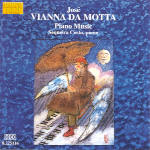Although he’s best known as one of Liszt’s last pupils, the Portuguese pianist/composer Jose Vianna da Motta’s aesthetic owes less to the Liszt/Wagner “music of the future” axis than to the conservative Germanic sobriety of his mentor Hans von Bülow. Yet the wistful tunes and lilting snap of non-nationalistic pieces such as the D major Sonata and the Op. 16 Ballada suggest love-children reared by a middle-aged Brahms and the young Albéniz. By contrast, the Cenas portuguesas and two Barcarolas make telling compositional and pianistic use of traditional Portuguese dances and popular melodies. It’s probably safe to say that Vianna da Motta composed best when he worked with small forms. I’m especially moved by Adeus, minha terra (Farewell, my country), whose lyrical curve is momentarily jarred by murmuring rumbles in the bass register–an oddly memorable effect.
Many years ago I owned some terrific Chopin and Rachmaninov recordings on LP that featured pianist Sequeira Costa. What a joy it is to hear him again! He has a sixth sense for how these pieces ought to go, and his phrasing sparkles with that inexplicable quality I like to call “inevitable spontaneity”, or is it “spontaneous inevitability”? Indeed, the dapper zest he brings to the yummy Valsa caprichosa far surpasses the composer’s own relatively stiff and stodgy piano playing in a 1928 recording. This is charming, unpretentious, well-crafted piano music, with a terrific pianist to match. What more do you want?
































